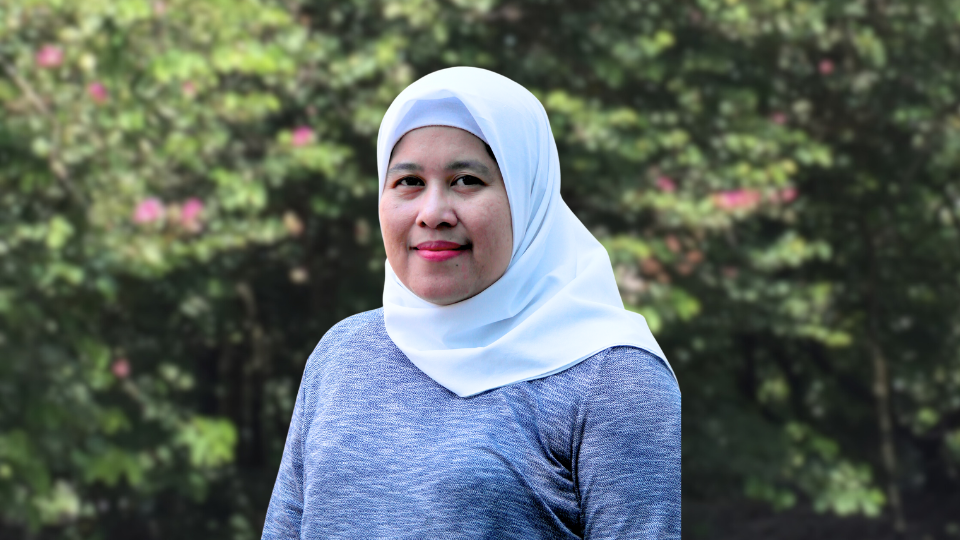Melia Famiola Hariadi is a lecturer at the SBM ITB, with a background in agricultural science. She is deeply committed to addressing environmental and sustainability issues in Indonesia. When asked about her academic background, which diverges from business studies yet led her to sustainability, Melia emphasized the importance of exploration.
“When we explore and align practice with theory, we gain feedback and new knowledge that equips us with real-world skills,” she explained.
A Childhood of Moving Around
Born into a family of civil servants, Melia spent her childhood moving frequently, living in districts and small towns far from provincial capitals, including Lubuk Sikaping on the border of West Sumatra and North Sumatra.
In 1995, she pursued her dream of becoming an architect by enrolling at SMA 2 Padang while living in a boarding house. Though initially uncertain about her choice, she eventually chose to study Agroindustry at the Bogor Agricultural Institute (IPB) through an invitation program, marking the start of her journey in agriculture.
Finding Passion in Agriculture
Initially, Melia felt disconnected from the agricultural industry. However, she continued her studies, hoping to uncover its broader significance.
“Studying agriculture is crucial for life, especially with today’s focus on sustainability. My background has helped me understand this field’s various issues and challenges,” Melia remarked.
This understanding inspired her to pursue a master’s in Industrial Engineering at ITB, specializing in agriculture-based industries. She identified Indonesia’s primary challenge as the variety of agricultural products and the lack of downstream industries to add value.
“We face significant challenges in creating a sustainable food system today,” she added.
Academic and Professional Contributions
In 2002, Melia completed her thesis on the social and environmental aspects of the agricultural industry, which captured the attention of Prof. Surna Tjahja Djajadiningrat (Prof. Naya), then Director General at the Ministry of Energy and Mineral Resources. Prof. Naya saw great potential in her work, which was groundbreaking in addressing sustainability in Indonesia.
“Prof. Naya was surprised because sustainability was rarely discussed in Indonesia at the time. He recognized its importance for a sustainable economy, especially agriculture,” said Melia.
Prof. Naya invited Melia to teach alongside him at leading universities, including the University of Indonesia and Padjadjaran University. Together, they co-authored their first book, “Eco-Industrial Park: Environmentally Friendly Industrial Area”, in 2004.
Establishing SBM ITB
In 2003, Melia joined Prof. Naya and the founders of SBM ITB to assist in establishing the school, which officially opened on December 31, 2003.
“Prof. Naya asked if I wanted to be an administrative staff member or a lecturer. To become a lecturer, I needed a doctoral degree. I decided to become a temporary tutor and focus on sustainability and CSR,” she explained.
Pursuing a Doctorate and Initiating Sustainability Programs
2009 Melia began her PhD in Sustainable Corporation at Macquarie University, Australia. After completing her studies in 2013, she returned to Indonesia and launched programs like Teras Hijau, Circular Dago, and Circular Sukaraja. These initiatives empower vulnerable communities to build resilience and promote sustainable practices.
Designing SBM ITB ESG
In 2023, Melia was entrusted by SBM ITB’s founders and stakeholders to develop the SBM ITB ESG initiative, aiming to position the school as a leader in sustainability. Among the programs she designed was the SBM ITB ESG Award, which recognizes sustainable innovators in Indonesia and fosters collaboration.
“I believe sustainability requires collaboration. While we can learn from books and media, sustainability inherently involves togetherness and harmony,” Melia said.
The event engaged diverse stakeholders, including the SBM ITB community and the broader public, encouraging businesses to innovate for greater impact.
“Through collaboration, SBM gains valuable insights to refine its education system and align research with real-world challenges. This helps create superior programs and activities for SBM and its students,” she noted.
Teaching Principles and Advice to Students
As a lecturer, Melia emphasizes exploration and openness in education, believing that diverse teaching backgrounds broaden students’ horizons.
“This approach helps students learn tolerance and gain unique perspectives that add value to their knowledge,” she said.
She advised students not to assume they always know what’s best for themselves.
“There is a destiny written by God. When things don’t go as planned, lower your ego, embrace the experience, and the wisdom will reveal itself. Find a path that leads to the same goal. Happiness comes when everything is in harmony,” she concluded.





